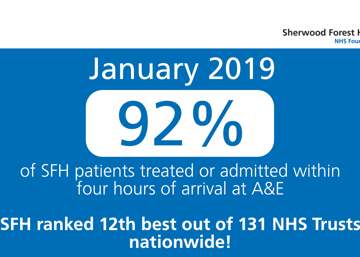Sherwood Forest Hospitals continues to provide one of the best performing Emergency Departments in the country
Posted Tuesday, February 19, 2019 3:57 PM

Winter pressures are being felt across the whole health system this winter, however, Sherwood Forest Hospitals winter plan is continuing to provide patients in Mansfield and Ashfield with one of the best performing hospital emergency departments in the country latest NHS data shows.
During January, 92% of Sherwood Forest Hospital’s patients were seen and treated within four hours, which placed the Trust 12th best out of 131 Trusts nationwide for the month.
The figures are showing a significant improvement from January 2018 when 87.2% of patients were seen within the four hour target. Despite being very busy, with an average of 447 patients seen per day, 92% of patients were seen and treated within four hours.
The Trust recognises that much of this is down to the hard work of staff for helping to keep patients safe and has placed the improved performance on a number of key factors including having an improved plan for winter than in previous years, and strong working with other organisations such as East Midlands Ambulance Service (EMAS) and Social Care.
The Trust has also seen a record 81% of frontline staff take up their flu vaccination which helps to protect the community against the virus and contributes to lower sickness absences.
Chief Operating Officer for Sherwood Forest Hospitals, Simon Barton, said: “We learned a lot from last winter, and have put that learning into place with our plans for this year. As anticipated we have been very busy this winter, and this trend continues.
“That is no different from anywhere in the NHS though, and we feel we’ve been better prepared for the pressures that winter inevitably brings. Our numbers so far for winter are encouraging, and but we need to remember that when we’re talking about numbers we are talking about individual people and the care that they receive.
“Our staff have been working incredibly hard to provide the level of care that we want for our patients, and I would like to thank them for everything that they do. It’s important to remember that that isn’t just colleagues in our emergency department, but reflects the whole of our organisation working together.
“We also need to recognise the huge contribution that our partner organisations make to our performance, including ambulance colleagues, and colleagues in social care that help us safely discharge patients and free up beds for patients that need them.
“It is crucial to remember that winter is only halfway through when looking at January’s data, historically, both February and March are very pressurised months for the NHS and this year it looks like the impact of flu may well be felt in some of those months. We forecast lots of pressure ahead, but we will continue to do everything we can to treat patients as we would expect a member of our own family to be treated.”
Winter pressures – how you can help?
NHS services nationwide come under pressure every winter, but there are things that you can do to help services run as smoothly as possible
- Choose the right service
NHS 111 is more than a helpline. Depending on your situation, the fully trained team can connect you to a nurse, emergency dentist or GP, and can arrange face-to-face appointments if appropriate. - Flu
There is still time to get your flu jab to help protect yourself and others. The flu jab is free for many people including those with certain long-term conditions, pregnant women, and the elderly.
Anyone who has flu symptoms is urged to stay away from hospitals and care homes to help stop the virus from spreading to vulnerable. - Norovirus (winter vomiting bug)
As with flu, norovirus is very contagious. People with vomiting or diarrhoea also being urged to make sure you stay at home and get plenty of rest. Avoid leaving your house until you’re at least 48 hours symptom-free.
News Archives
-
2024
- January
- Message to the public as Nottingham and Nottinghamshire health and care system continues to face pressures
- February
- Celebrating our Leap Day babies and a patient's 100th birthday
- Celebrating our diverse workforce on Overseas NHS Workers Day
- March
- April
- Over 16,000 tests delivered through Nottinghamshire’s first Community Diagnostic Centre
- May
- June
- July
- 2023
- 2022
- 2021
-
2020
- February 2020
- January 2020
- Coronavirus
- March 2020
- Latest visiting times at Sherwood Forest Hospitals
- April 2020
- May 2020
- June 2020
- July 2020
- August 2020
- September 2020
- First patient gets Total Hip Replacement at Newark Hospital and is back home safely on the same day
- October 2020
- November 2020
- December 2020
- Covid – 19 Vaccination information
- 2019
- 2018
- Communications and Media
- Body-worn cameras introduced at Sherwood Forest Hospitals to help protect staff and patients from violence and aggression
- Sherwood Forest Hospital Trust announces comprehensive plan to help manage the challenges of winter
